Follow the Rules and Protect Your Health!
I get a lot of mail from folks who are interested in eating more of a whole food, plant-based diet. They ask if I have any suggestions on where to start. I love the question and yes, I sure do have some suggestions. They’re summed up beautifully in author, Michael Pollan’s, succinct and compelling little book, Food Rules. It’s research-based, concise, compelling.
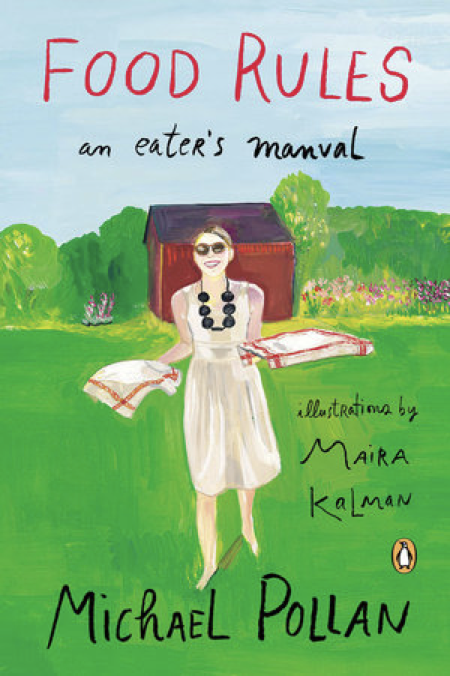
There are basically three important things you need to know about the links between diet and health, and these facts are so sturdy that we can build a sensible diet lifestyle upon them:
Populations that eat the Western diet—defined as a diet of lots of processed foods and meat, lots of added bad fats and sugar, lots of refined grains, lots of everything except vegetables, fruits, and whole grains—suffer from high rates of the so-called Western diseases: obesity, type 2 diabetes, cardiovascular disease, and cancer.
Populations eating a wide range of traditional diets—whether high in seal blubber (like the Inuits), high in maize and beans (like the Central American Indians), or high in grass-fed protein and dairy (like the African Masai) don’t suffer from these chronic diseases. This suggests that there is no single ideal human diet, but that humans are exquisitely adapted to a wide range of different foods and a variety of different diets. Except, that is, for one: the relatively new Western diet that most of us are now eating.
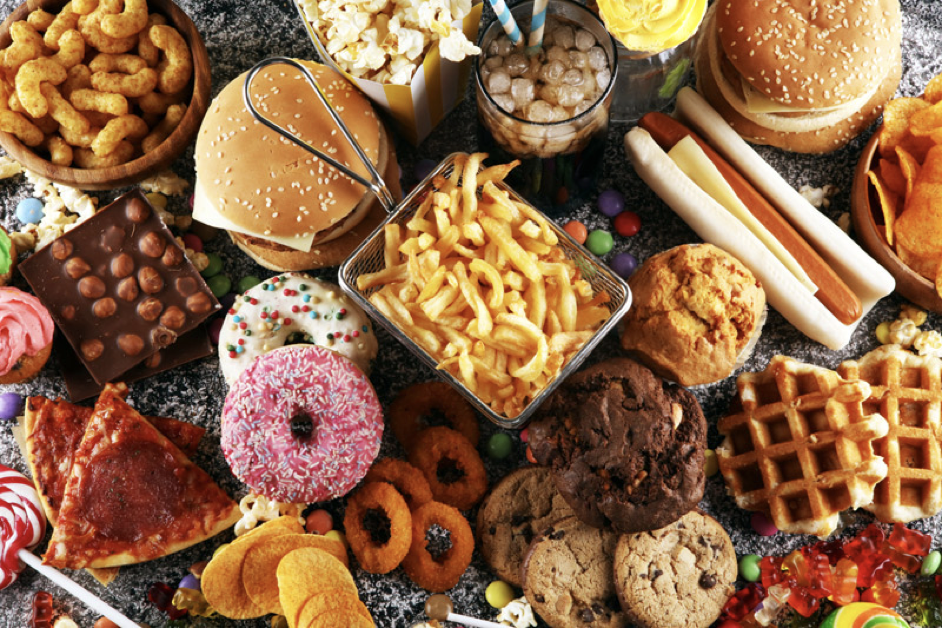
People who get off the Western diet see dramatic improvements in their health. Proven research says the effects of the Western diet can be rolled back, and relatively quickly! And Pollan introduces, through his basic food rules, a means to help us get off this detrimental diet.
He launches his tested advice succinctly with “Eat food. Not too much. Mostly plants.” Then he elaborates on these 64 food rules. Here’s a healthy selection of health-promoting from FOOD RULES. See if these don’t inspire you to change some habits and move forward to better health and more energy:
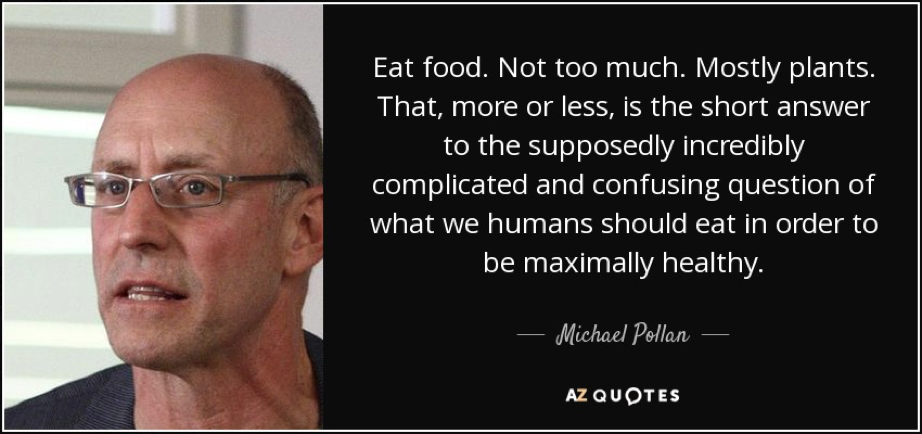
Eat food—choose REAL food and avoid “edible food-like substances.”
Don’t eat anything your great-grandmother (or grandmother) wouldn’t recognize as food.
Avoid food products containing ingredients that no ordinary human would keep in the pantry. Ethoxylated diglycerides? Propylene Glycol Alginate? Really—we need this stuff?
Avoid everything with high-fructose corn syrup (HFCS). Don’t fall for the food industry’s latest scam: products reformulated to contain “no HFCS” or “real cane sugar.”
Avoid products that have some form of sweetener listed among the top three ingredients. Labels list ingredients by weight; anything with more sugar than other ingredients has too much sugar.
Avoid products that contain more than five ingredients.
Avoid products containing ingredients that a 3rd-grader can’t pronounce. Keep it simple.
Avoid products with health claims. For a product to carry a health claim on its package, it must first have a package, so right off it’s likely to be processed rather than a whole food.
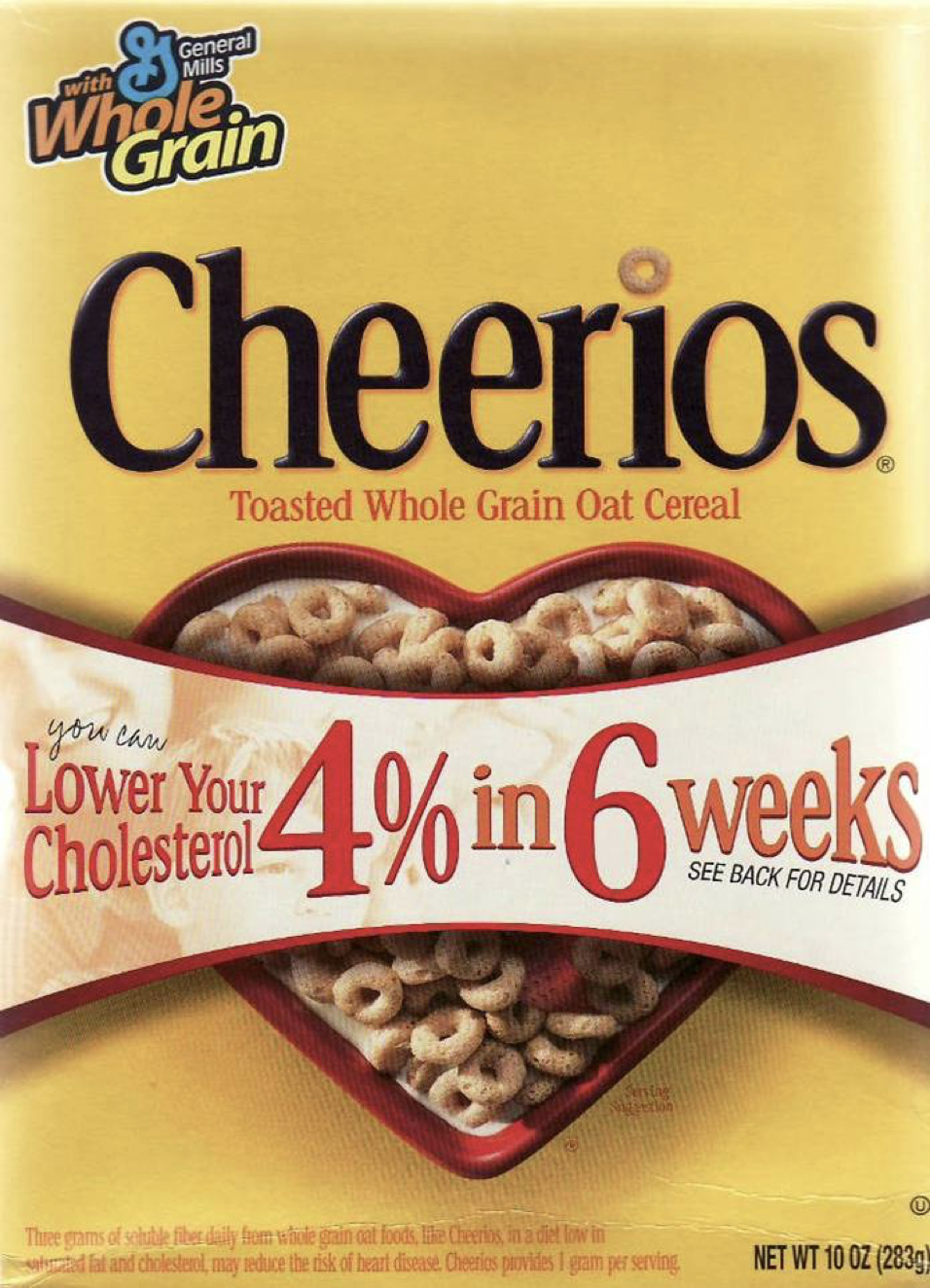
Avoid products called “lite,” “low-fat,” or “nonfat.” It’s better to eat the real thing in moderation than to binge on “lite,” “low-fat” or “nonfat” anything.
Avoid things that pretend to be something they aren’t. Margarine is a good example.
Shop the peripheries of the supermarket and stay out of the middle.
Eat only foods that eventually rot. Real food is alive and will eventually die.
Shop the farmers’ market as often as you can. They sell real food.
Eat only foods that have been cooked by humans, not corporations and industries.
If it came from a plant, eat it; if it was made in a plant, don’t.
Avoid things called by the same name in every language (Big Mac, Cheetos, or Pringles).
Eat mostly plants, especially leaves.
Eating what stands on one leg (mushrooms, plant foods) is better than eating what stands on two legs (fowl), which is better than eating what stands on four legs (cows, pigs, and other mammals). An old Chinese proverb.
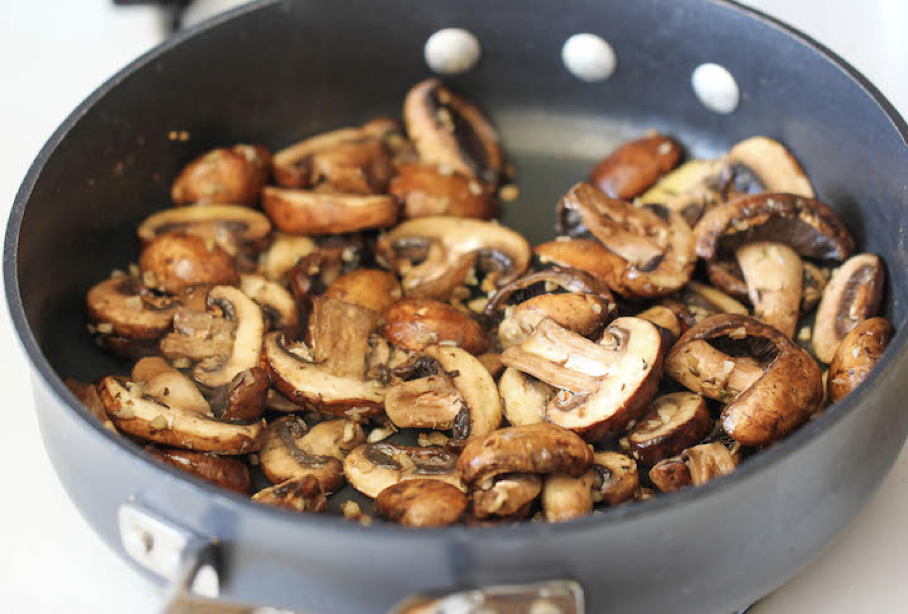
Eat your colors. The best protection comes from a diet containing as many different phytochemicals as possible (and they are colored).
If you have the space, buy a freezer as a means to store good buys on good food.
Avoid pre-sweetened and pre-salted products. Sweeten and salt your food yourself.
Eat sweet foods as you find them in nature (meaning with accompanying fiber).
Don’t eat breakfast cereals that change the color of the milk.
Avoid white flour; use whole grain flours.
Favor the kinds of oils and grains that have traditionally been stone-ground.
Eat all the junk food you want, as long as you cook and bake it yourself.
Be whole foods and health conscious and skip the supplements.
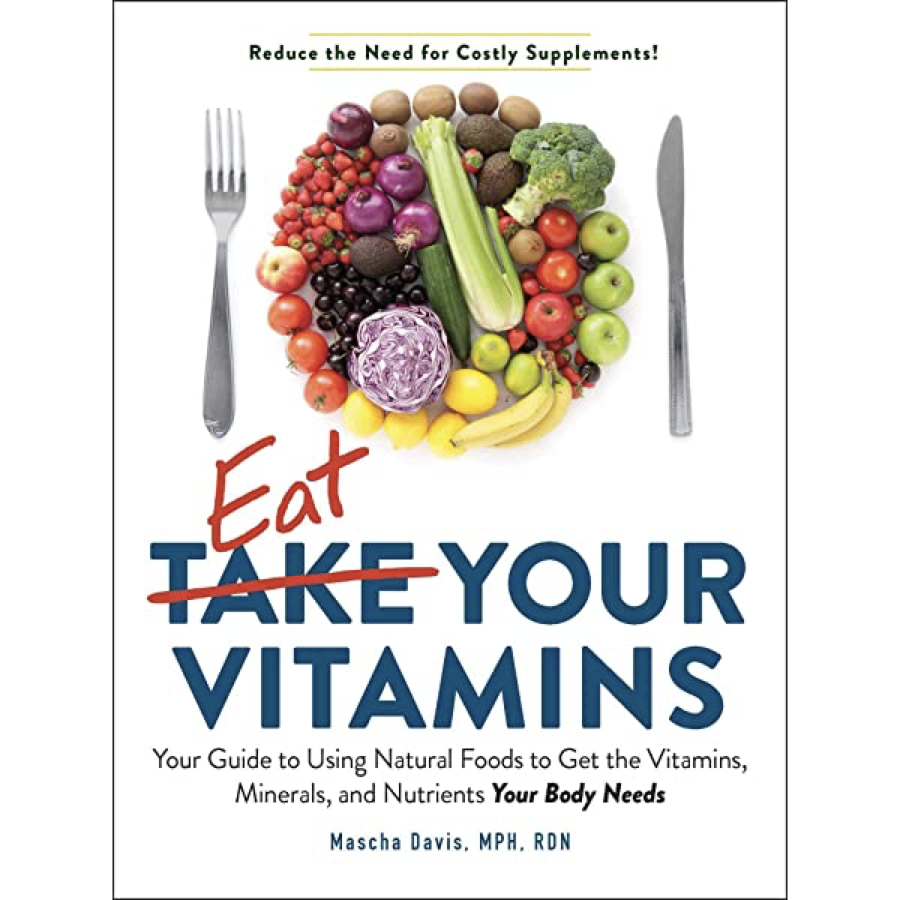
Eat more like the French. Or the Japanese. Or the Italians. Or the Greeks.
44. Pay more (for your food) but eat less of it.
Eat less. Calorie restriction and portion size slows aging and prevents cancer.
Stop eating before you’re full.
Eat when you are hungry, not when you’re bored.
Eat slowly.
Remember: The banquet is in the first bite, so take time to savor your food.
Eat from smaller plates and glasses.
Don’t go back for seconds.
Breakfast like a king, lunch like a prince, and dinner like a pauper.
Don’t get your fuel from the same place your car does, the convenience store/gas station.
Try not to eat alone.

Treat treats as treats, for special occasions.
Plant and eat from a vegetable garden if you have space, a window box if you don’t.
Cook.
Break the rules once in a while. Cultivate a relaxed attitude toward food—what matters is not the special occasion but the everyday practice—the default habits that govern your eating on a typical day.
Remember: “All things in moderation, including moderation.” (Oscar Wilde)

There are basically three important things you need to know about the links between diet and health, and these facts are so sturdy that we can build a sensible diet lifestyle upon them:
Populations that eat the Western diet—defined as a diet of lots of processed foods and meat, lots of added bad fats and sugar, lots of refined grains, lots of everything except vegetables, fruits, and whole grains—suffer from high rates of the so-called Western diseases: obesity, type 2 diabetes, cardiovascular disease, and cancer.
Populations eating a wide range of traditional diets—whether high in seal blubber (like the Inuits), high in maize and beans (like the Central American Indians), or high in grass-fed protein and dairy (like the African Masai) don’t suffer from these chronic diseases. This suggests that there is no single ideal human diet, but that humans are exquisitely adapted to a wide range of different foods and a variety of different diets. Except, that is, for one: the relatively new Western diet that most of us are now eating.

People who get off the Western diet see dramatic improvements in their health. Proven research says the effects of the Western diet can be rolled back, and relatively quickly! And Pollan introduces, through his basic food rules, a means to help us get off this detrimental diet.
He launches his tested advice succinctly with “Eat food. Not too much. Mostly plants.” Then he elaborates on these 64 food rules. Here’s a healthy selection of health-promoting from FOOD RULES. See if these don’t inspire you to change some habits and move forward to better health and more energy:

Eat food—choose REAL food and avoid “edible food-like substances.”
Don’t eat anything your great-grandmother (or grandmother) wouldn’t recognize as food.
Avoid food products containing ingredients that no ordinary human would keep in the pantry. Ethoxylated diglycerides? Propylene Glycol Alginate? Really—we need this stuff?
Avoid everything with high-fructose corn syrup (HFCS). Don’t fall for the food industry’s latest scam: products reformulated to contain “no HFCS” or “real cane sugar.”
Avoid products that have some form of sweetener listed among the top three ingredients. Labels list ingredients by weight; anything with more sugar than other ingredients has too much sugar.
Avoid products that contain more than five ingredients.
Avoid products containing ingredients that a 3rd-grader can’t pronounce. Keep it simple.
Avoid products with health claims. For a product to carry a health claim on its package, it must first have a package, so right off it’s likely to be processed rather than a whole food.

Avoid products called “lite,” “low-fat,” or “nonfat.” It’s better to eat the real thing in moderation than to binge on “lite,” “low-fat” or “nonfat” anything.
Avoid things that pretend to be something they aren’t. Margarine is a good example.
Shop the peripheries of the supermarket and stay out of the middle.
Eat only foods that eventually rot. Real food is alive and will eventually die.
Shop the farmers’ market as often as you can. They sell real food.
Eat only foods that have been cooked by humans, not corporations and industries.
If it came from a plant, eat it; if it was made in a plant, don’t.
Avoid things called by the same name in every language (Big Mac, Cheetos, or Pringles).
Eat mostly plants, especially leaves.
Eating what stands on one leg (mushrooms, plant foods) is better than eating what stands on two legs (fowl), which is better than eating what stands on four legs (cows, pigs, and other mammals). An old Chinese proverb.

Eat your colors. The best protection comes from a diet containing as many different phytochemicals as possible (and they are colored).
If you have the space, buy a freezer as a means to store good buys on good food.
Avoid pre-sweetened and pre-salted products. Sweeten and salt your food yourself.
Eat sweet foods as you find them in nature (meaning with accompanying fiber).
Don’t eat breakfast cereals that change the color of the milk.
Avoid white flour; use whole grain flours.
Favor the kinds of oils and grains that have traditionally been stone-ground.
Eat all the junk food you want, as long as you cook and bake it yourself.
Be whole foods and health conscious and skip the supplements.

Eat more like the French. Or the Japanese. Or the Italians. Or the Greeks.
44. Pay more (for your food) but eat less of it.
Eat less. Calorie restriction and portion size slows aging and prevents cancer.
Stop eating before you’re full.
Eat when you are hungry, not when you’re bored.
Eat slowly.
Remember: The banquet is in the first bite, so take time to savor your food.
Eat from smaller plates and glasses.
Don’t go back for seconds.
Breakfast like a king, lunch like a prince, and dinner like a pauper.
Don’t get your fuel from the same place your car does, the convenience store/gas station.
Try not to eat alone.

Treat treats as treats, for special occasions.
Plant and eat from a vegetable garden if you have space, a window box if you don’t.
Cook.
Break the rules once in a while. Cultivate a relaxed attitude toward food—what matters is not the special occasion but the everyday practice—the default habits that govern your eating on a typical day.
Remember: “All things in moderation, including moderation.” (Oscar Wilde)
Sources:
www.penguinrandomhouse.com
www.wholeheartfamilymedicine.com
www.azquotes.com
www.foodpolitics.com
www.damndelicious.net
www.amazon.com
www.ageukmobility.uk.co
 Alice Osborne
Alice Osborne
Weekly Newsletter Contributor since 2006
Email the author! alice@dvo.com
